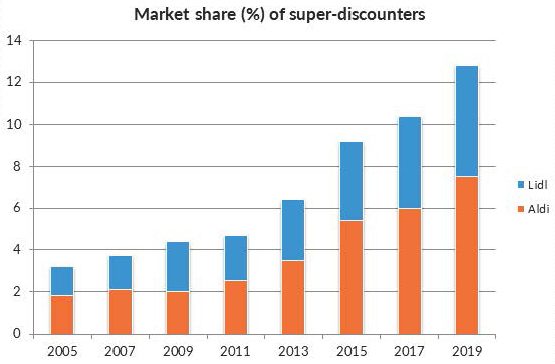Historically, the UK has not had as effective competition policies as other countries – but that can change
The announcement of an in depth investigation into competition in the UK market in funerals is welcome. It suggests that the UK is getting more effective and active competition authorities and represents an improvement in an area of policy that in the past has been neglected. There is a lively popular debate about whether the modern market economy works to the advantage of ordinary people, generating jobs and increasing living standards in the way that it was once recognised to do. The public get irritated by their everyday experiences in dealing with utility companies and banks, for example. People have the perception that every business interest is heard, but the concern of the consumer is the last thing that gets taken into account.
Putting the consumer at the heart of policy
Policy Exchange in its work on trade and the future for food and farm policy has made the interest of the consumer central to its analysis and policy recommendations. An important part of Policy Exchange’s Prosperity agenda is the recognition that markets have to work for households in practical ways and that effective competition policy is necessary for a well-functioning market economy that maximises economic welfare.
Past weaknesses and recent improvements
Historically, the UK has not had as effective competition policies as other countries, such as Germany and the United States. A point well made by Nicholas Crafts in the National Institute’s Economic Review article ‘Persistent Productivity Failure in the UK: Is the EU Really to Blame?’ One of the beneficial influences of the EU on the British economy was the spur that it gave to the development of more robust competition policy. The Enterprise Act 2002, which brought the UK’s competition policy into line with EU obligations and modern international practice, was seminal in this regard. So was the establishment of the Competition and Markets Authority (CMA) under the Enterprise and Regulatory Reform Act 2013 as the competition authority responsible for ensuring that competition and markets work well for consumers. It brought together the functions of the Office of Fair Trading and the Competition Commission. A good example of the quality of work that CMA already does is its landmark report on the long-term social care market – the Care homes market study published in 2017. It exposed the monopsony behaviour of public sector purchasers of care and the manner in which ‘self-funders’ effectively subsidise the care bought for people by local authorities. Though things are getting better, there is clearly much more left to do.
Historically, defective markets that gave business which operated in them significant market power have been left undisturbed. The result was that consumers in those markets lost out and the fortunate companies received a monopoly rent for a protracted period. It took years for the principal supermarket chains to face competition that intruded beyond the effective barriers to entry that protected them from contest and challenge. In the end, it turned out to be foreign businesses that identified an opportunity.
The Competition and Market Authority’s ambitious agenda
The new Chairman of the CMA, Lord Tyrie, in a letter to the Secretary of State for Business has called for additional powers. At its heart is an audacious agenda to put the consumer at the heart of UK competition policy. Lord Tyrie proposes that the CMA and the courts should have a new duty to treat the interests of consumers and their protection from detriment as paramount. This new duty would, in his proposal, be backed by new functions and powers. These would include powers of swift investigation and intervention to put a stop to market abuse which acts to the detriment of consumers. Consumer law would be changed to make it responsive enough to address fast-moving markets and sufficiently robust to deter wrong-doing.
Statuary powers and policy statements are one thing, but having the vim and determination to use them against powerful business and public sector interests is another. The approach taken by the CMA recently to a proposed supermarket merger shows that it has the determination to use its existing powers with a confidence and vigour that its predecessors lacked – from the post-war years to the period of structural reform in the 1980s and 1990s.
The importance of having competition authorities that have the confidence to act
Lord Tyrie, the Chairman of the CMA understoods the central role that competition policy and the protection of the consumer should have in public policy. Lord Tyrie has made the point that regulation and competition law has to evolve as markets and economies evolve. Historically in the UK, the competition authorities have more often than not been behind the curve. Today in its actions and the agenda it is seeking to pursue, the CMA is showing how an effective competition authority can attempt to keep up with rapidly changing market structures.
The challenges go beyond the impact of technology
Lord Tyrie’s agenda should cohere with the review that Professor Jason Furman, the former chair of the US Council of Economic Advisers under President Obama, has undertaken at the request of the Chancellor into the challenges for competitive markets that arise from digitalisation. This recommended that competition policy should be extended to issues relating to the ownership of data. Yet while the impact of digital platforms and the striking growth of technology firms attracts vivid attention, there is a huge amount of work to be done ensuring that much less glamourous markets remain open and work in the interest consumers.
These include things such as hotel bookings, groceries and children’s toys. The CMA recognises that there appears to have been a rise in market power. This has been reflected in rising market concentrations and profitability across a number of sectors that enables large firms to collect excess rents. Technology may have been an aggravating factor making it possible for firms more effectively to target and segment consumers according to their willingness to pay. A striking fact in Lord Tyrie’s letter is listed in a footnote that it would be easy to pass over. The CMA estimate that UK economy-wide profit margins have risen from around 1.2 in 1980 to 1.7 today. The CMA plainly recognises the scale of its challenges and is developing an agenda to meet them.


